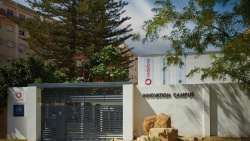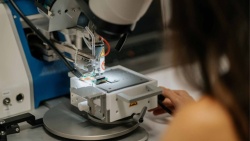The Doctoral INPhINIT Fellowships Call 2023 from «la Caixa» is now open.
La Caixa” Foundation grants 65 Doctoral INPhINIT fellowships for talented early-stage researchers of any nationality to pursue their PhD studies in Spain or Portugal. This fellowships programme is aimed at supporting the best scientific talent and fostering innovative and high-quality research in Spain and Portugal by recruiting outstanding international students and offering them an attractive and competitive environment for conducting research of excellence.
At ICMAB we offer 10 different projects in the field of physics, chemistry, materials engineering and nanotechnology and biochemistry. Apply for ICMAB if you dare to discover!
The doctoral INPhINIT fellowships offer a highly competitive salary and complementary opportunities for training on transferrable skills through annual training sessions, incentives upon completion of the thesis, among other elements that make these fellowships some of the most attractive and complete in Europe.
This programme is divided into two frames:
- Incoming: 35 fellowships for researchers willing to pursue PhD studies in research centres accredited with the Spanish Seal of Excellence Severo Ochoa, María de Maeztu or Health Institute Carlos III and Portuguese units accredited as “excellent” according to the evaluation of the Fundação de Ciência e Tecnologia. More information
- Retaining: 30 fellowships for researchers willing to pursue PhD studies in any research domain and any university or research center in Spain or Portugal. More information
Open Projects
PHYSICS
BIOCHEMISTRY
MATERIALS and NANOTECHNOLOGY
CHEMISTRY
How to apply
- Access to the applications platform of ”la Caixa” Foundation fellowships programme.
- Register to be notified when the next call for applications is open
For any questions or queries please send an email to: fellowships@fundacionlacaixa.org. If you have any further questions please contact msalas@icmab.es at ICMAB.
Economic Allowance
The fellowship amount covers the fellow’s costs according to the following breakdown:
- Labour costs: €35,800 per year which the host institution will spend on the hiring of the fellow in accordance with the labour legislation in force in Spain or Portugal.
- Research costs: €3,500 per year for expenses directly related to the development of the project, including conference registrations, courses, stays, consumables, equipment, intellectual property costs, etc.
- The tuition fees to the official doctoral programme where the fellow will be admitted to.
- Bonus of €7,500 if the fellows deposit the thesis within 6 months after the third year of their fellowship has ended.
Selection procedure
The selection process consists of three consecutive phases:
PHASE 1 – ELEGIBILITY:
All applications are reviewed to check the accomplishment of the eligibility criteria published in the rules for participation.
PHASE 2 – PRE-SELECTION:
Each eligible application is assessed remotely for at lest two evaluators with relevant experience in the same discipline. The criteria governing the evaluation in this phase are as follows:
- Academic record and curriculum vitae (weight 50 %): the candidate’s qualifications will be evaluated as well as the academic and/or professional curriculum in relation to the career stage and the opportunities they may have had.
- Motivation and statement of purpose (weight 30 %): the excellence of the ideas introduced in the statement of purpose will be assessed, considering their originality, innovative approach and their potential impact as well as the suitability of the host institution chosen and the studies or research to pursue.
- Reference letters (weight 20 %): the reference letters received will be assessed, considering both the specificity of their content regarding the candidates as well as the profile of the referees.
PHASE 3 – PERSONAL INTERVIEWS:
Preselected candidates are invited to a personal interview before a multidisciplinary committee, which evaluates them according to the criteria listed below:
- Candidate’s potential (weight 40 %): the candidate’s potential will be assessed considering their soft skills, such as clarity, consistent discourse and articulation of ideas, ability to express complex and independent reasoning, originality, entrepreneurship, leadership and teamwork.
- Motivation and statement of purpose (weight 30 %): the excellence of the ideas introduced in the statement of purpose will be assessed, considering their originality, innovative approach and their potential impact as well as the suitability of the host institution chosen and the studies or research to pursue.
- Academic and professional background (weight 30 %): academic and professional background of the candidate in relation to the career stage and the opportunities they may have had.
Requirements
Incoming:
- Research experience: Candidates must be in the first four years of their research career and must not have previously obtained a PhD degree or be in a position to apply for one.
- Academic records: Applicants must hold a higher education degree that makes them eligible to enrol in a doctoral programme in Spain/Portugal when starting at their host institutions. The verification of the level of studies equivalent to those mentioned above will be carried out by the host university during the admission procedure.
- Mobility: Candidates must not have resided or carried out their main activity (work, studies, etc.) in Spain/Portugal for more than twelve months in the three years immediately prior to the deadline for applications.
- Level of English: Candidates must accredit an advanced level of English (B2 or higher)
Retaining:
- Research experience: Candidates must be in the first four years of their research career and must not have previously obtained a PhD degree or be in a position to apply for one.
- Academic records: Applicants must hold a higher education degree that makes them eligible to enrol in a doctoral programme in Spain/Portugal when starting at their host institutions. The verification of the level of studies equivalent to those mentioned above will be carried out by the host university during the admission procedure.
- Mobility: Candidates must have resided or carried out their main activity (work, studies, etc.) in Spain/Portugal for more than twelve months in the three years immediately prior to the deadline for applications. In addition, candidates who are finally awarded a fellowship must carry out the PhD at a university that is different from where they took up their bachelor’s studies.
- Level of English: Candidates must accredit an advanced level of English (B2 or higher)
If you have any further questions, or if there are particular issues you’d like to discuss regarding your potential PhD project, please contact msalas@icmab.es. For details of the grant, applications and selection criteria process, and other general questions, please visit the INPhINIT programme website.
Useful dates
No projects or additional documentation can be presented outside the deadlines established in the rules of the call for applications.
Incoming:
25 January 2023, at 2 pm Peninsular Spain
Deadline for submitting applications.
18 April 2023
Notification of the shortlist results and arrangement of interviews.
23, 24 and 25 May 2023
Face-to-face interviews.
8 June 2023
Communication of the final results.
From 8 to 30 June 2023
Matching host institution-fellow.
Retaining:
16 February 2023, at 2 pm Peninsular Spain
Deadline for submitting applications.
19 May 2023
Communication of the shortlist results and arrangement of interviews.
14, 15 and 16 June 2023
Face-to-face interviews.
29 June 2023
Communication of the final results.
More details
- Download the INCOMING programme rules, and the RETAINING programme rules.
- Find the projects in the «FINDER» website.
- If you have any further questions, or if there are particular issues you’d like to discuss regarding your potential PhD project, please contact msalas@icmab.es.
- For details of the grant, applications and selection criteria process, and other general questions, please visit the INPhINIT programme website.
About ICMAB
The Institute of Materials Science of Barcelona (ICMAB) is an internationally renowned research center in Advanced Functional Materials and Nanomaterials that belongs to the Spanish National Research Council (CSIC). The Institute has been recently awarded with the Severo Ochoa label of excellence by the Spanish Ministry of Economy and Competiveness. Our mission is to generate new knowledge in Materials Science through excellent scientific research useful for the society and for the European industry, economy and employment, consolidating our recognition as international reference center on Smart functional materials through five mission-oriented Research Lines associated to three societal grand challenges (Clean Energy, Smart and Sustainable Electronics and Smart Nanomedicine).The Institute is located in a favorable research environment, concentrating one of the largest capabilities in Spain and Southern Europe (UAB Campus near Barcelona). Recently, our facilities have been significally expanded to accommodate 500 m2 of laboratories and offices.
ICMAB competitiveness can be inferred from the high percentage of our yearly budget raised from competitive funds. A sizable fraction of these funds are secured from our participation in EU projects. Our publications receive at present ~11.200 citations/yr, with ~220 articles published per year. Our leadership position in Catalonia, Spain and Europe is also recognized by the number of active ERC grantees (18), a figure which only a few excellent research centers exhibit in Spain. Our researchers are internationally competitive in several materials science domains, including energy storage & conversion, superconducting materials, multifunctional oxide thin films, theory & simulation, solid state chemistry or multifunctional molecular and supramolecular materials. The training of the future generations of researchers represents also an essential part of the overall mission of ICMAB, with ~25 PhD theses defended per year. We provide trainees with both a solid fundamental background in materials science and a practical mindset to facilitate their adaptation to academic and industrial environments. If you are looking for an opportunity to develop your research career and skills in a multicultural and friendly environment, ICMAB is the place for you.



